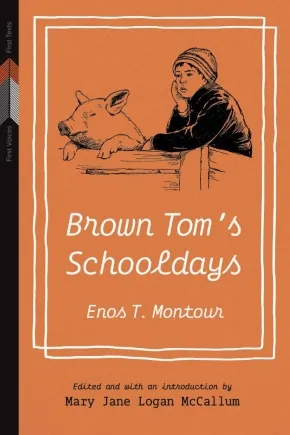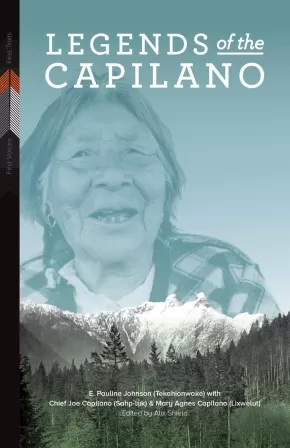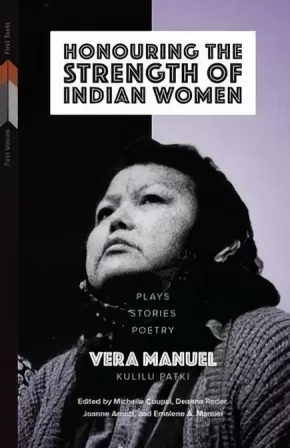First Voices, First Texts
First Voices, First Texts aims to re-connect contemporary readers with some of the most important Indigenous literature of the past, much of which has been unavailable for decades. This series reveals the richness of these works by providing newly re-edited texts that are presented with particular sensitivity toward Indigenous ethics, traditions, and contemporary realities. The editors strive to indigenize the editing process by involving communities, by respecting traditional protocols, and by providing critical introductions that give readers new insights into the cultural contexts of these unjustly neglected classics.
Synopsis:
Residential school life through the eyes of a child.
Enos Montour's Brown Tom's Schooldays, self-published in 1985, tells the story of a young boy's life at residential school. Drawn from Montour's first-hand experiences at Mount Elgin Indian Residential School between 1910 and 1915, the book is an ironic play on "the school novel," namely 1857's Tom Brown's Schooldays by Thomas Hughes.
An accomplished literary text and uncommon chronicle of federal Indian schooling in the early twentieth century, Brown Tom's Schooldays positions Brown Tom and his schoolmates as citizens of three worlds: the reserve, the "white man's world," and the school in between. It follows Tom leaving his family home, making friends, witnessing ill health and death, and enduring constant hunger.
Born at Six Nations of the Grand River in 1899, Montour earned degrees in Arts and Divinity at McGill University and served as a United Church minister for more than thirty years, honing his writing in newspapers and magazines and publishing two books of family history. Brown Tom's Schooldays reflects Montour's intelligence and skill as well as his love of history, parody, and literature.
This critical edition includes a foreword by the book's original editor, Elizabeth Graham, and an afterword by Montour's granddaughters, Mary Anderson and Margaret McKenzie. In her introduction, historian Mary Jane Logan McCallum documents Montour's life and work, details Brown Tom's Schooldays's publication history, and offers further insight into the operations of Mount Elgin. Entertaining and emotionally riveting, Montour's book opens a unique window into a key period in Canada's residential school history.
Reviews
"A fantastic read. People need more books like this, which are directly related to the TRC but are also a testament to the strength and creativity of Indigenous literature." — Crystal Fraser, University of Alberta
"Brown Tom's Schooldays is a literary artifact from the residential school era. In this fictionalized coming of age account, Enos Montour captures the youthful hopes, dreams, and disappointments of his real life upbringing at Mount Elgin, one of Canada's earliest and longest running residential schools. Unique in style, tone, and perspective, Schooldays is an important read for anyone interested in understanding the residential school system and for all of us who call the lower Great Lakes home." — Thomas Peace, Huron at Western University
Educator Information
This book is part of the First Voices, First Texts series.
Table of Contents
Foreword: On A Personal Note, The Making of Brown Tom’s Schooldays, 1982–1984 by Elizabeth Graham
Introduction: Enos Montour, Brown Tom, and “Ontario Indian” Literature by Mary Jane Logan McCallum
Brown Tom’s Schooldays by Enos Montour
Chapter 1: Salad Days
Chapter 2: Brown Tom Arrives
Chapter 3: Brown Tom's Three Worlds
Chapter 4: The Milling Herd
Chapter 5: Loaf 'n' Lard
Chapter 6: Brown Tom Makes a Deal
Chapter 7: Too Big for Santa Claus
Chapter 8: Brown Tom's Happy Days
Chapter 9: Trial By Fire
Chapter 10: Brown Tom "Has It Bad"
Chapter 11: Brown Tom Gets Religion
Chapter 12: The Roar of Mighty Waters
Chapter 13: Happy Hunting Ground for Noah
Chapter 14: War Clouds Over Mt. Elgin
Chapter 15: Brown Tom "Arrives"
Afterword by Mary Anderson and Margaret McKenzie
Appendix 1: Glossary of Idioms and References in Brown Tom’s Schooldays
Appendix 2: Bibliography of Works by Enos Montour
Endnotes
Bibliography
Additional Information
216 pages | 5.50" x 8.50" | 20 b&w illustrations, 3 maps | Paperback
Synopsis:
Bringing the Legends home
Legends of the Capilano updates E. Pauline Johnson’s 1911 classic Legends of Vancouver, restoring Johnson’s intended title for the first time. This new edition celebrates the storytelling abilities of Johnson’s Skwxwú7mesh (Squamish) collaborators, Joe and Mary Capilano, and supplements the original fifteen legends with five additional stories narrated solely or in part by Mary Capilano, highlighting her previously overlooked contributions to the book.
Alongside photographs and biographical entries for E. Pauline Johnson, Joe Capilano, and Mary Capilano, editor Alix Shield provides a detailed publishing history of Legends since its first appearance in 1911. Interviews with literary scholar Rick Monture (Mohawk) and archaeologist Rudy Reimer (Skwxwú7mesh) further considers the legacy of Legends in both scholars’ home communities. Compiled in consultation with the Mathias family, the direct descendants of Joe and Mary Capilano and members of the Skwxwú7mesh Nation, this edition reframes, reconnects, and reclaims the stewardship of these stories.
Reviews
"Shield has skilfully opened up a new avenue to the past with potentially wide-ranging appeal both to scholars and students and to general readers."— Jean Barman
Educator Information
This book is part of the First Voices, First Texts series.
Additional Information
256 pages | 5.50" x 8.50" | Paperback
Synopsis:
This critical edition delivers a unique and comprehensive collection of the works of Ktunaxa-Secwepemc writer and educator Vera Manuel, daughter of prominent Indigenous leaders Marceline Paul and George Manuel. A vibrant force in the burgeoning Indigenous theatre scene, Vera was at the forefront of residential school writing and did groundbreaking work as a dramatherapist and healer. Long before mainstream Canada understood and discussed the impact and devastating legacy of Canada’s Indian residential schools, Vera Manuel wrote about it as part of her personal and community healing. She became a grassroots leader addressing the need to bring to light the stories of survivors, their journeys of healing, and the therapeutic value of writing and performing arts.
A collaboration by four Indigenous writers and scholars steeped in values of Indigenous ethics and editing practices, the volume features Manuel’s most famous play, "Strength of Indian Women"—first performed in 1992 and still one of the most important literary works to deal with the trauma of residential schools—along with an assemblage of plays, written between the late 1980s until Manuel’s untimely passing in 2010, that were performed but never before published. The volume also includes three previously unpublished short stories written in 1988, poetry written over three decades in a variety of venues, and a 1987 college essay that draws on family and community interviews on the effects of residential schools.
Reviews
“An invaluable contribution to our literature about residential school experiences and the effects of transgenerational trauma. With so many current projects focused on “reconciliation,” this republication of Vera Manuel’s works recalls the often forgotten side of the equation: the truth, unvarnished by politics or bureaucracy.”– Jesse Archibald-Barber, Associate Professor of Indigenous Literatures and Performance, First Nations University of Canada
“Layered with intergenerational wisdom, replete with lived experience, this collection deftly presents both the devastating legacy of residential schools and the complex systems of care that sustain Indigenous women and fuel Indigenous resurgence.”– Carleigh Baker, author of Bad Endings
Educator & Series Information
This book is part of the First Voices, First Texts series.
Topics: Indigenous Studies, Literature, Performing Arts, Poetry.
Additional Information
416 pages | 5.50" x 8.50" | 13 b&w photographs | bibliography









